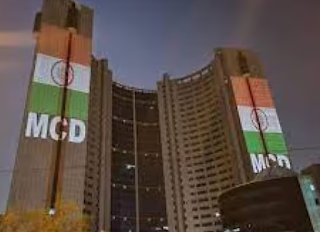Following its decisive victory in the Delhi Assembly elections, the Bharatiya Janata Party (BJP) has now shifted its focus to the upcoming Municipal Corporation of Delhi (MCD) mayoral elections, which are expected to take place in April 2025. A victory in this election would enable the BJP to establish a "triple-engine" government in Delhi, where it would hold power at the central, state, and municipal levels. The party, buoyed by its return to power in Delhi after 27 years, is eager to strengthen its grip on the governance of the national capital by securing control of the municipal body.
In the 2025 Delhi Assembly elections, the BJP secured 48 out of the 70 available seats, marking a significant political comeback after nearly three decades. The Aam Aadmi Party (AAP), which had dominated Delhi’s political landscape for the past decade, managed to win only 22 seats, a sharp decline from its previous tally. Meanwhile, the Congress, once a formidable force in the capital’s politics, suffered yet another setback, failing to win a single seat for the third consecutive time. The BJP’s victory was attributed to a combination of strong anti-incumbency against AAP, voter dissatisfaction over governance issues, and a well-executed election strategy by the saffron party’s leadership.
The Municipal Corporation of Delhi is a crucial administrative body responsible for overseeing various civic functions in the capital, including sanitation, infrastructure development, and public health. The corporation comprises a total of 250 elected councillors, in addition to seven Delhi MPs, three Rajya Sabha MPs, and 14 MLAs, who are all eligible to vote in the mayoral elections. Presently, AAP holds a slight edge with 122 councillors, while the BJP has 120. However, following the Delhi Assembly elections, eight BJP councillors won MLA seats and three AAP councillors were also elected to the Assembly, leading to a reshuffling of numbers. The departure of these councillors from the municipal body has created 12 vacant seats, which will be filled through by-elections. Additionally, the Lieutenant Governor of Delhi will appoint one nominated councillor. With these changes, the BJP's strength in the MCD currently stands at 112 councillors, while AAP has 119.
The most recent mayoral election took place in November 2024, when AAP’s Mahesh Kumar Khichi narrowly defeated BJP’s Kishan Lal by a margin of just three votes. At that time, AAP held 125 councillor seats and had the support of 13 MLAs and three Rajya Sabha MPs, giving it a total voting strength of 141. On the other hand, the BJP had 113 councillors, one MLA, and seven MPs, bringing its total strength to 121. Congress, which had eight councillors, chose to boycott the election. Due to political delays and legal complications, Mahesh Kumar Khichi’s tenure was shortened to just five months. His brief tenure as mayor saw continued friction between AAP and the BJP over various civic issues, particularly regarding budget allocations and governance priorities.
With the upcoming mayoral elections, the BJP sees a strategic opportunity to seize control of the MCD and consolidate its hold over Delhi’s governance. The party’s recent success in the Assembly elections has further boosted its confidence, and its leaders are working on a plan to maximize their chances of winning the mayoral race. BJP strategists believe that with the support of its 14 MLAs and seven MPs, the party stands a strong chance of securing victory in the upcoming election. Moreover, BJP sources have hinted at the possibility of introducing a no-confidence motion against the current AAP mayor to accelerate the power transition.
Political analysts suggest that the MCD mayoral election will serve as an important barometer for both AAP and BJP ahead of the 2029 Lok Sabha elections. If the BJP wins the mayoral post, it will not only cement its position in Delhi but also give the party momentum as it prepares for the next general elections. Conversely, if AAP manages to retain the mayoral seat, it could provide a much-needed morale boost for the party following its significant electoral setback in the Assembly polls.
As April approaches, both parties are expected to intensify their campaigns, with the BJP leveraging its recent electoral victory to rally support and AAP seeking to retain its stronghold in the municipal corporation. The political battle for the control of Delhi’s civic administration is set to be a high-stakes contest that will shape the governance of the national capital in the years to come.



